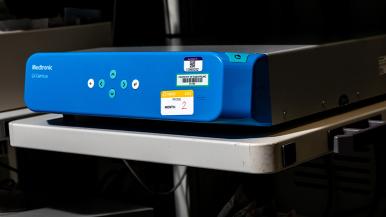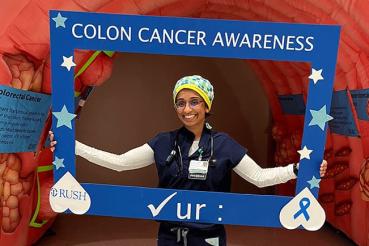CHICAGO — Rush University System for Health (RUSH) is the first hospital system in the United States to offer the artificial intelligence (AI)-assisted colonoscopy device for its patients in every screening procedure room.
The Medtronic GI Genius™ intelligent endoscopy systems were installed for immediate use at RUSH in February. The new AI technology helps detect colorectal polyps of varying shapes and sizes and alerts gastroenterologists to their presence in real time. The device looks for regions with visual characteristics that are compatible with known types of mucosal abnormalities. Polyps of concern are highlighted on the device’s screen and can make them easier for doctors to locate. More specifically, the module uses deep learning algorithms to help detect the colorectal polyps through enhanced visualization.
The installation of this AI technology marks the first step in a proposed broader collaboration between Medtronic and RUSH to advance future technologies and support peer training programs for physicians in the use of the latest innovations to treat digestive diseases.
“Here is another example of how RUSH is leading and innovating in the field of gastroenterology. This tool will provide a more visual and precise colonoscopy experience, leaving patients more confident of their physical health,” said Irving Waxman, MD, director of the Digestive Diseases service line at RUSH. “I understand the level of anxiety my patients carry regarding cancer and how it could impact their lives. That is why including the most detailed and precise technology in our hospitals is critical.”
Nearly one in 20 adults are diagnosed with colon cancer in their lifetime. The Medtronic GI Genius™ system uses artificial intelligence to increase the adenoma detection rate (ADR) of colorectal polyps by as much as 14.4%. Each 1% increase in ADR decreases the risk of cancer developing between routine screenings by 3%.1
This technology also provides a nearly 50% relative increase in the likelihood to detect multiple polyps during a colonoscopy and reduces endoscopists’ polyp miss rate by half when compared to the conventional colonoscopy process.2 Considering 90% of patients with colon cancer will beat it when caught early, it is critical to continue improving the levels of detection for patients.3
“This new technology will make a significant impact in patient outcomes,” said Joshua Melson, MD, medical director of Rush’s high-risk clinic for gastrointestinal cancers in the Division of Digestive Diseases. “Expert physicians will also benefit from this technology as they will be able to detect polyps more easily before they become cancerous. With colorectal cancer, early detection is critical.”
The technology will be available as a part of screening and diagnostic colonoscopy procedures at Rush University Medical Center in Chicago, Rush Copley Medical Center in Aurora, Rush Oak Park Hospital and Rush Oak Brook.
Innovations such as the use of AI technology set Rush apart and as a leader among the country’s best institutions. U.S. News & World Report ranked Rush University Medical Center among the best in the nation for gastroenterology and GI surgery. The hospital also earned a top ranking for cancer and high performing status for colon cancer surgery.
About RUSH
Rush University System for Health brings together the brightest minds in medicine, research and academics. Driven by discovery, innovation and a deep responsibility for the health of our communities, Rush is a national leader in outstanding patient care, education, research, community partnerships and empowering a new generation of health care providers.
Rush University Medical Center is ranked among the top hospitals in the nation by U.S. News & World Report. The Medical Center was also ranked No. 2 in the nation by Vizient and named a Top Teaching Hospital by The Leapfrog Group.
Rush University System for Health includes Rush University Medical Center, Rush University, Rush Copley Medical Center and Rush Oak Park Hospital, as well as an extensive provider network and numerous outpatient care facilities. Rush University comprises four colleges: Rush Medical College, the College of Nursing, the College of Health Sciences and the Graduate College.




